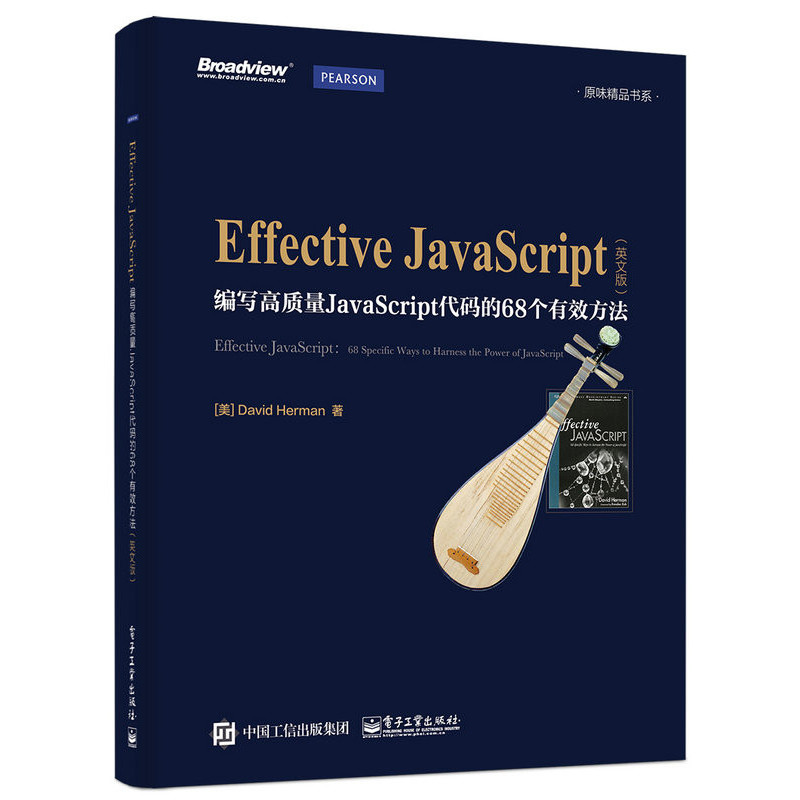
包邮Effective JavaScript编写高质量JavaScript代码的68个有效方法-(英文版)

- ISBN:9787121273032
- 装帧:暂无
- 册数:暂无
- 重量:暂无
- 开本:16开
- 页数:205
- 出版时间:2016-04-01
- 条形码:9787121273032 ; 978-7-121-27303-2
本书特色
本书由资深 javascript 技术专家 david herman 所著。书中基于 javascript 标准的新版本前所未有地阐明了 javascript 语言的内部运作机制——帮助你充分利用 javascript 语言的表现力。通过全书归纳的 68 个行之有效的方法和大量具体实例,作者详细讲解了如何更有效地运用这门灵活且富有表现力的语言,以及如何规避其缺陷。你将学到如何选择正确的编程风格,管理一些超出意料的问题,以及成功使用 javascript 编程完成从数据结构到并发的方方面面。无论你写了多久的 javascript 代码,本书都将有助于增进你对这门强大的编程语言的理解,助你编写更可预测、更可靠且具维护性的程序。
内容简介
通过全书归纳的68个行之有效的方法和大量具体实例,你将学会:*更好地使用基于原型的面向对象编程方式*数组和字典对象的微妙区别和解决方案*javascript函数和变量作用域语义方面的精确、务实的解说*一些有用的javascript编程模式和惯用法,比如选项对象和方法链*使用javascript独特的“运行到完成”的方式深入阐释并发
目录
相关资料
这是一本绝不辜负 effective 软件开发系列期望的编程书籍。对于任何一位想要做到严谨编程的 javascript 开发者来说,这本书绝对不容错过。本书阐述了 javascript 内部工作细节,以期帮助读者更好地利用 javascript 语言优势。——erik arvidsson,高级软件工程师很少有像 david 这样的编程语言极客能如此舒适、 友好地讲解编程语言。他带我们领会 javascript 的语法和语义,这个过程既令人陶醉又极其深刻。本书以舒适的节奏额外提供了一些“有问题”的现实案例。当读完这本书后,你会感觉自己获得了一种强大而全面的掌控能力。——paul irish,google chrome 开发主管在阅读本书之前,我以为它只是另一本关于如何更好地使用 javascript 编程的书籍。然而它远不止如此,它还会使你更深入地理解 javascript 这门语言,这一点至关重要。如果没有这层对 javascript 的深入理解,那么你绝不会懂得语言本身的任何东西,知道其他的程序员是如何编写代码的。如果你想成为一名真正优秀的 javascript 开发者,那么请阅读此书。就我而言,我多么希望在**次用 javascript 编程时就已经阅读了它。——anton kovalyov,jshint 开发者如果你正在寻找一本正式且极具可读性及洞察力的 javascript 语言书籍的话,那不用舍近求远了。javascript 开发者能够从其中找到珍贵的知识宝藏,甚至技术精湛的 javascript 程序员也一定能从中获益。对于有其他语言经验而想一头扎进 javascript 世界的从业人员来说,本书是迅速学习 javascript 的必读之物。然而,不管你的背景如何,都不得不承认作者 dave herman 在探索 javascript 方面做得非常棒——javascript 的优势部分、不足部分或介于两者之间的所有内容都囊括于本书之中。——rebecca murphey,bocoup 高级 javascript 开发者对于任何一位理解 javascript 并且想要完全掌握它的人来说,本书都是必不可少的读物。dave herman 带给了读者深刻的、具有研究和实践意义的 javascript 语言理解,通过一个接一个的例子指导并帮助读者达到与他同样的理解高度。这不是一本寻求捷径的书籍,恰恰相反,它是一本难得的将经验提炼为指南的书籍。它是一本为数不多让我毫不犹豫推荐的关于 javascript 的书籍。——alex russell,tc39 成员,google 软件工程师很少有人能有机会学到大师的手艺。这本书弥补了这种遗憾,其对 javascript 的研究就像随一位时间旅行哲学家回到公元前 5 世纪与柏拉图一同学习一般。——rick waldron,javascript 传教士,bocoup
作者简介
David Herman,资深JavaScript技术专家,Ecma TC39委员会成员,负责JavaScript的标准化工作。他拥有格林内尔学院的计算机科学学士学位和美国东北大学的计算机科学硕士及博士学位,现任Mozilla研究院高级研究员。
-

硅谷之火-人与计算机的未来
¥13.7¥39.8 -

造神:人工智能神话的起源和破除 (精装)
¥32.7¥88.0 -

软件定义网络(SDN)技术与应用
¥26.1¥39.8 -

自己动手写PYTHON虚拟机
¥31.0¥79.0 -

Photoshop平面设计实用教程
¥14.5¥39.8 -

.NET安全攻防指南(下册)
¥89.0¥129.0 -

RUST权威指南(第2版)
¥114.2¥168.0 -

.NET安全攻防指南(上册)
¥89.0¥129.0 -

大模型实战:微调、优化与私有化部署
¥66.3¥99.0 -

人工智能的底层逻辑
¥55.3¥79.0 -

多模态数据融合与挖掘技术
¥34.7¥45.0 -

仓颉编程快速上手
¥62.9¥89.8 -

剪映AI
¥55.6¥88.0 -

FINAL CUT短视频剪辑零基础一本通
¥28.9¥39.8 -

FLASK 2+VUE.JS 3实战派――PYTHON WEB开发与运维
¥83.8¥118.0 -

人工智能安全
¥66.4¥109.0 -

AI赋能写作:AI大模型高效写作一本通
¥34.3¥49.0 -

网络设备安装与调试(华为eNSP模拟器)(第2版)
¥37.4¥49.8 -

信息系统监理师考试大纲
¥13.5¥15.0 -

大模型应用开发极简入门 基于GPT-4和ChatGPT
¥41.9¥59.8













